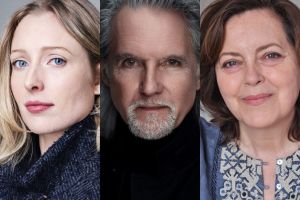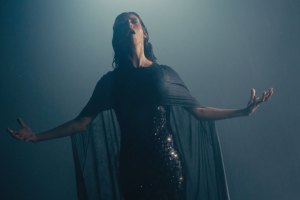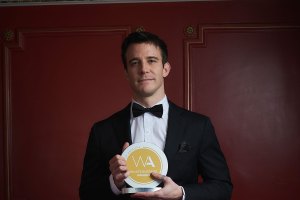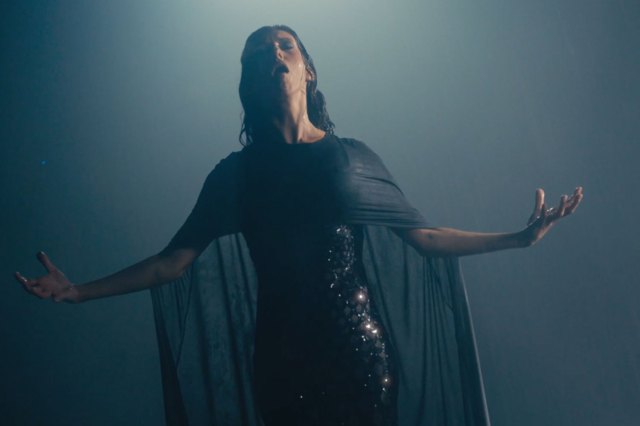Has The Kite Runner changed much for the stage?
I suppose it has changed in some ways because it’s such a big book in terms of what it goes through that they had to simplify it. It’s very different watching something than reading something so you do have to make a few tweaks here and there. Probably the nicest compliment that we’ve had as a company is we’ve had so many people come up to us and say you’ve done the book proud and that we’ve stayed very faithful to the story.
There’s some very tough material, how difficult was it portraying that?
The character that I play, Amir, he narrates the whole thing. In terms of staging the rape obviously we didn’t want to offend anyone so you don’t really see very much. I turn to the audience and narrate what happens and actually I think it hits harder in that way because things are always much worse if you allow the audience to imagine it themselves, we bring our own hell to it somehow. The worst possible images we can imagine we throw at what we’re being described and it means that it will therefore be different for each person.
What response have you had from the audience so far?
Honestly we’ve been totally bowled over by the response in Nottingham. We were at the playhouse and we’ve completely smashed the box office. It’s a lot of people’s favourite book and it means so much to so many people. I’ve had people coming over at the end of the play in floods of tears, or on the flip side hysterical laughter -it seems almost like it was a nervous response – and sitting me down and saying thank you so much for telling the story in the very honest way that we do as a cast. We’ve had standing ovations, we’ve had people cheering and screaming pretty much every night. I’ve been on stage now for about 12 years, I love the theatre it’s sort of where I was born really and I’ve never heard as an actor – there’s a chunk at the end of the play when I talk to them about what happened – and I’ve never heard silence like it.
It’s very emotional then, to perform and to witness?
It is. We sort of smack them over the head in the first half and then the second half is much lighter. I’m not going to lie, it is a heart breaker I’d definitely bring a tissue or two. I’ve heard people wailing in the second half, people really crying their eyes out. What I love about what we’re doing is you’ve got sixteen year-olds sitting there next to sixty year-olds and they’re all feeling it together and they’re all crying together. This play, not only is it incredibly current with the sort of issues that it deals with, but it’s also about the human heart. Even though it’s about two Afghani children, it’s about all of us. Everyone can find something to relate to in it.
What would you want people to take way from the play?
I don’t think that’s my decision. I just hope we’re doing this story justice. I’m really proud of it and I want as many people to see it as possible. I think it’s full of bold brave performances. It’s full of heart. It’s not a political piece, I don’t want to give that impression but there is a political slant, which is also very important for people to know. It’s telling a story about Afghanistan, about children in Afghanistan, about the Taliban, about the Russians, what communism did and as I said the rise and fall of the Taliban. So not only is it current in the political sense but it’s massively relevant for us as Brits on a human scale.
It shows a side of Afghanistan that many people don’t think about?
Absolutely because we look at immigration here in this country and we see it on the TV and we say isn’t that terrible, but what Hosseini has done is he has made the issue of immigration human.
What are you looking forward to about taking the play to Liverpool?
I haven’t been there for about ten years so I’m really looking forward to seeing it and seeing how different it is from ten years ago, when I was there right at the start of my career. One of my best mates is from Liverpool as well, actor Shaun Evans, so I’ll probably hang out with him a little bit. He can show me round the Merseyside. And also I’ve got a little soft spot for the accent as well so it will nice to hang out with a few cheeky scousers while we’re there.
What are your plans following the run?
I’ve been a bit reluctant to move on. My head is so in the play but also I really want people to get behind it and I would love it to grow some legs. I’d love it to go to London obviously because it’s by far the biggest, most demanding thing I’ve ever done and parts like this don’t come along often, they just don’t. It dwarfs Hamlet, maybe not in a deep ridden angst sort of way but my character, he never leads the stage and it’s a challenge every single night. I’m speaking to the audience, directly to the audience, and it’s a part I’m not quite ready to let go of yet. I’m just waiting to see what’s going to happen with it before I move on.
Ben Turner was speaking to Joanna Ing
The Kite Runner is at the Liverpool Playhouse from 13 June to 6 July.












